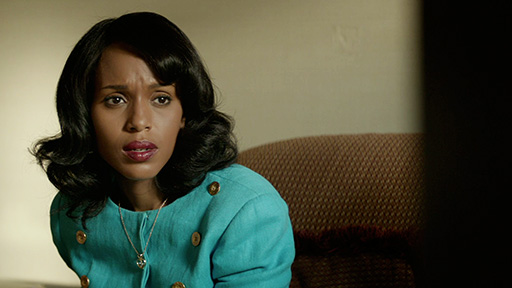 History is being told again tonight through television — not through a documentary process but through a film version.
History is being told again tonight through television — not through a documentary process but through a film version.
The filters of the present day, from race relations to intransigent Senate forces to a Supreme Court vacancy all help to make “Confirmation” (HBO, 8 p.m.), an almost too straightforward retelling of the case against Clarence Thomas by Anita Hill that played out a couple of days in 1991, more compelling than it might have been.
At the time, the allegations of verbal sexual harassment by a Republican nominee for Supreme Court Justice captivated the country — and were released the weekend before the expected confirmation. The hastily drawn hearings and the dropping of the ball by the chair of the Senate Judiciary Committee — who happens to be the current vice president of the United States, Joe Biden — who presented the two principals in the wrong order and then wouldn’t even question a second woman who came forward — resulted in seating one of the more ineffectual justices in court history.
But it also opened up for all time the reality of sexual harassment in the workplace and institutions set up methods to combat, even if they haven’t completely succeeded.
The TV film, directed by Rick Famuyiwa, succeeds, as most HBO films do, on the casting alone.
Kerry Washington brings the right subdued dignity to the role of Hill, who was reluctant from the start to tell her story. Wendell Pierce, from “The Wire” and many things after, has a more difficult task in portraying Thomas, because the enigmatic, largely silent justice remains largely unknowable. He does his best to bring dignity to the part (it would never do that he would even hint a raised eyebrow or roving eye).
The voice we know best from the drama, Biden, is almost uncannily brought from Greg Kinnear, who is so close to the tone you almost think they’ve spliced in Biden audio at times.
The rest of the senators are sometimes way different than you would have expected. Treat Williams as Ted Kennedy, for example; but Bill Irwin is strong as John Danforth largely because nobody remembers him much.
Some are so tied to their historical figures and their transcripts it’s tough to eke out the drama. So Grace Gummer is enlisted to serve as a Kennedy aide who personifies the female outrage the case would bring.
For those who remember that moment in time, it’s absorbing to fall into that time tunnel once more. For those who wouldn’t have remembered, it will be helpful to point out how recently this all happened.
Still, as in “The People vs. O.J. Simpson,” it’s exasperating that the filmmakers do not take a stand on guilt or innocence (or pretend not to). There are no flashback scenes to what really happened or did not happen to establish a narrative truth; they just go on what was being said at the time.
Does mean they’re trying to be balanced? Or do they expect viewers to come with their own conclusions?
(What could have motivated her to go through such a humiliating experience if it weren’t true? Yet as late as Friday night, on Bill Maher some Republican maintained that liberals were desperate to do anything to keep this conservative off the bench).
A whole lot of the long drama is given to the testimony itself, since it was so riveting at the time. But that doesn’t leave time for much else, including a conclusion.
Cuba Gooding Jr. got a little testy at me at a bar earlier this year when I asked him how he could play a character and not know if he were innocent or guilty (“I don’t tell you how to do your job,” he told me).
But Pierce too took the same point of view.
“As an actor, you’re always searching for the humanity of the character,” Pierce told reporters at the TV Critics Association winter press tour. “I hope people don’t prejudge the film because of his reputation. But I had to check my own prejudice about who I thought he was and then had this wonderful epiphany studying the man and realized how much we had in common.
“I realized that the only way that I was going to be able to play the man was to be authentic and true to his humanity and his experience,” he said. “The situation just gives you a wealth of things to play: What did I do? Do I even remember it? At the pinnacle of my career, something comes from my past that challenges it.
“That is something that we all can understand and put ourselves into. And so those are the variables that an actor deals with when playing the role,” Pierce said. “I didn’t think of him as a political figure. I thought of him as a man about to lose the greatest opportunity he ever had.”
“The story is way more complicated than just he said, she said,” Washington said.
And it was complicated for her to play as well, she added.
“I was 14 when it was originally happening, but I was in a household with an academic,” Washington said. “My mother was an academic who had very passionate feelings about it as a woman of color. My dad had very passionate feelings about it as a black man.
“And I was immersed in how complicated and how complex the issues were from a very young age, and it always stuck with me how passionate both of my parents were and how differently they looked at the situation. And so that was part of what was important for all of us in the making of this film, is that we really courageously stick to the complexity of the situation and not try to one-note any character or any one moment of this process.”